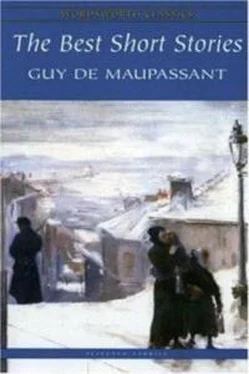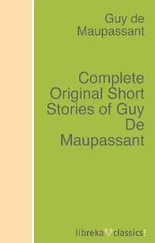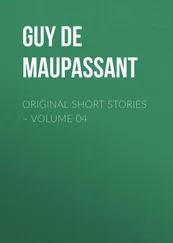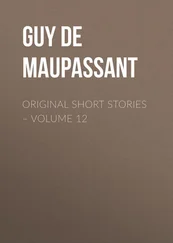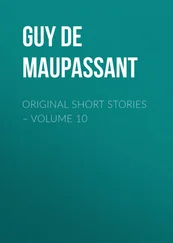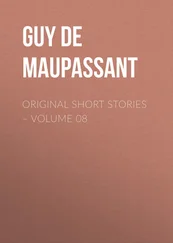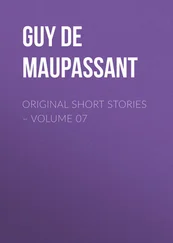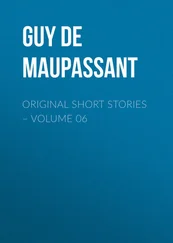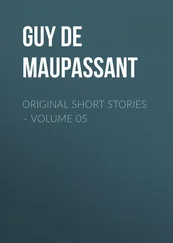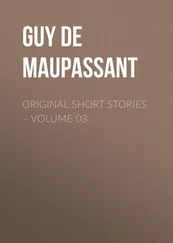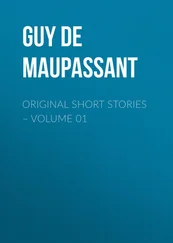Toward midnight, tired with walking, worn out by grief and fear, he at last fell into a doze in his chair, for he was afraid of his bed as one is of a haunted spot. But suddenly the strident cry of the other evening pierced his ears, and it was so shrill that Ulrich stretched out his arms to repulse the ghost, and he fell backward with his chair.
Sam, who was awakened by the noise, began to howl as frightened dogs do howl, and he walked all about the house trying to find out where the danger came from. When he got to the door, he sniffed beneath it, smelling vigorously, with his coat bristling and his tail stiff, while he growled angrily. Kunsi, who was terrified, jumped up, and, holding his chair by one leg, he cried: "Don't come in, don't come in, or I shall kill you." And the dog, excited by this threat, barked angrily at that invisible enemy who defied his master's voice. By degrees, however, he quieted down and came back and stretched himself in front of the fire, but he was uneasy and kept his head up and growled between his teeth.
Ulrich, in turn, recovered his senses, but as he felt faint with terror, he went and got a bottle of brandy out of the sideboard, and he drank off several glasses, one after anther, at a gulp. His ideas became vague, his courage revived and a feverish glow ran through his veins.
He ate scarcely anything the next day and limited himself to alcohol, and so he lived for several days, like a drunken brute. As soon as he thought of Gaspard Hari, he began to drink again, and went on drinking until he fell to the ground, overcome by intoxication. And there he remained lying on his face, dead drunk, his limbs benumbed, and snoring loudly. But scarcely had he digested the maddening and burning liquor than the same cry, "Ulrich!" woke him like a bullet piercing his brain, and he got up, still staggering, stretching out his hands to save himself from falling, and calling to Sam to help him. And the dog, who appeared to be going mad like his master, rushed to the door, scratched it with his claws and gnawed it with his long white teeth, while the young man, with his head thrown back drank the brandy in draughts, as if it had been cold water, so that it might by and by send his thoughts, his frantic terror, and his memory to sleep again.
In three weeks he had consumed all his stock of ardent spirits. But his continual drunkenness only lulled his terror, which awoke more furiously than ever as soon as it was impossible for him to calm it. His fixed idea then, which had been intensified by a month of drunkenness, and which was continually increasing in his absolute solitude, penetrated him like a gimlet. He now walked about the house like a wild beast in its cage, putting his ear to the door to listen if the other were there and defying him through the wall. Then, as soon as he dozed, overcome by fatigue, he heard the voice which made him leap to his feet.
At last one night, as cowards do when driven to extremities, he sprang to the door and opened it, to see who was calling him and to force him to keep quiet, but such a gust of cold wind blew into his face that it chilled him to the bone, and he closed and bolted the door again immediately, without noticing that Sam had rushed out. Then, as he was shivering with cold, he threw some wood on the fire and sat down in front of it to warm himself, but suddenly he started, for somebody was scratching at the wall and crying. In desperation he called out: "Go away!" but was answered by another long, sorrowful wail.
Then all his remaining senses forsook him from sheer fright. He repeated: "Go away!" and turned round to try to find some corner in which to hide, while the other person went round the house still crying and rubbing against the wall. Ulrich went to the oak sideboard, which was full of plates and dishes and of provisions, and lifting it up with superhuman strength, he dragged it to the door, so as to form a barricade. Then piling up all the rest of the furniture, the mattresses, palliasses and chairs, he stopped up the windows as one does when assailed by an enemy.
But the person outside now uttered long, plaintive, mournful groans, to which the young man replied by similar groans, and thus days and nights passed without their ceasing to howl at each other. The one was continually walking round the house and scraped the walls with his nails so vigorously that it seemed as if he wished to destroy them, while the other, inside, followed all his movements, stooping down and holding his ear to the walls and replying to all his appeals with terrible cries. One evening, however, Ulrich heard nothing more, and he sat down, so overcome by fatigue, that he went to sleep immediately and awoke in the morning without a thought, without any recollection of what had happened, just as if his head had been emptied during his heavy sleep, but he felt hungry, and he ate.
The winter was over and the Gemmi Pass was practicable again, so the Hauser family started off to return to their inn. As soon as they had reached the top of the ascent the women mounted their mule and spoke about the two men whom they would meet again shortly. They were, indeed, rather surprised that neither of them had come down a few days before, as soon as the road was open, in order to tell them all about their long winter sojourn. At last, however, they saw the inn, still covered with snow, like a quilt. The door and the window were closed, but a little smoke was coming out of the chimney, which reassured old Hauser. On going up to the door, however, he saw the skeleton of an animal which had been torn to pieces by the eagles, a large skeleton lying on its side.
They all looked close at it and the mother said:
"That must be Sam," and then she shouted: "Hi, Gaspard!" A cry from the interior of the house answered her and a sharp cry that one might have thought some animal had uttered it. Old Hauser repeated, "Hi, Gaspard!" and they heard another cry similar to the first.
Then the three men, the father and the two sons, tried to open the door, but it resisted their efforts. From the empty cow–stall they took a beam to serve as a battering–ram and hurled it against the door with all their might. The wood gave way and the boards flew into splinters. Then the house was shaken by a loud voice, and inside, behind the side board which was overturned, they saw a man standing upright, with his hair falling on his shoulders and a beard descending to his breast, with shining eyes, and nothing but rags to cover him. They did not recognize him, but Louise Hauser exclaimed:
"It is Ulrich, mother." And her mother declared that it was Ulrich, although his hair was white.
He allowed them to go up to him and to touch him, but he did not reply to any of their questions, and they were obliged to take him to Loeche, where the doctors found that he was mad, and nobody ever found out what had become of his companion.
Little Louise Hauser nearly died that summer of decline, which the physicians attributed to the cold air of the mountains.
George's father was sitting in an iron chair, watching his little son with concentrated affection and attention, as little George piled up the sand into heaps during one of their walks. He would take up the sand with both hands, make a mound of it, and put a chestnut leaf on top. His father saw no one but him in that public park full of people.
The sun was just disappearing behind the roofs of the Rue Saint–Lazare, but still shed its rays obliquely on that little, overdressed crowd. The chestnut trees were lighted up by its yellow rays, and the three fountains before the lofty porch of the church had the appearance of liquid silver.
Monsieur Parent, accidentally looking up at the church clock, saw that he was five minutes late. He got up, took the child by the arm, shook his dress, which was covered with sand, wiped his hands, and led him in the direction of the Rue Blanche. He walked quickly, so as not to get in after his wife, and the child could not keep up with him. He took him up and carried him, though it made him pant when he had to walk up the steep street. He was a man of forty, already turning gray, and rather stout. At last he reached his house. An old servant who had brought him up, one of those trusted servants who are the tyrants of families, opened the door to him.
Читать дальше
